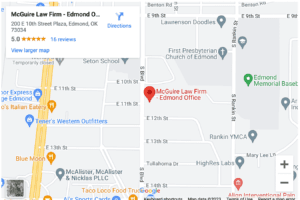Breach of Duty Attorney in Oklahoma City

If a plaintiff in a personal injury lawsuit cannot prove that the defendant breached a duty of care, the plaintiff cannot win the case.
Breach of duty is an essential legal element in a negligence case. Most personal injury cases are based on negligence claims.
What is Negligence?
It is helpful to review the elements of a negligence claim to understand a breach of duty. Injury claims based on negligence include automobile accidents, medical malpractice, product liability, slip and fall accidents, nursing home abuse, premises liability claims, and many more.
The legal elements of a negligence case are:
- Duty of care
- Breach of duty of care
- Causation
- Damages
Each of the elements links together to form a chain of causation. If you cannot prove each element and link them together, it is unlikely you will recover compensation for your injuries and damages.
A duty is the obligation to act in a specific manner required by law, personal commitment, morality, or custom. The duty of care requires that a person act with a level of care that a reasonable person of ordinary judgment would act. Negligence is the failure to act with the level of care or a "breach of duty."
Establishing That a Duty of Care Existed
In a personal injury lawsuit, the first step is for the plaintiff to prove that the defendant owed a duty to the plaintiff. The law recognizes a duty when a relationship between the plaintiff and the defendant requires the defendant to act with a specific level of care. For example, a duty of care exists between doctors and their patients to provide adequate care for patients. Drivers owe a duty of care to avoid causing accidents that could injure others on the road.
Businesses owe a duty of care to their customers to keep their premises reasonably safe. Manufacturers owe a duty of care to consumers to produce products that are safe to use for their intended purpose.
Once the plaintiff establishes that a duty of care existed, the next step is to prove that the defendant's actions breached that duty of care.
How Does the Defendant Breach the Duty of Care?
A defendant breaches the duty of care when the defendant fails to use a standard of care that a reasonable person would have used in the same or similar circumstances. A jury decides whether a defendant exercised reasonable care.
The first step is to establish what the standard of care would be in a given situation. The standard of care is based on how a "reasonable person" would have acted in the situation. A "reasonable person" is an ideal person. There is no set definition of what a reasonable person would do in any situation.
Determining what a reasonable person would have done is an objective standard. The jury decides how a reasonable person would have acted given the same or similar facts. For example, would a reasonable person leave spilled oil on the floor when he knows that people will be walking through the oil? A reasonable person would clean up the oil because it posed a risk of harm or take steps to warn people not to walk through the oil because they could fall.
Would a reasonable person allow a 12-year-old to drive a truck in normal circumstances? No, a reasonable person understands that it is against the law, and allowing a child to drive a vehicle could put others at risk of harm.
In some cases, an injury lawyer may need expert witnesses to establish the acceptable standard of care in a situation.
Medical experts testify what a doctor with similar training and experience would have done in a similar situation for medical malpractice cases. Violating the standard of care is the same as breaching the duty of care. If the defendant's acts were inconsistent with the standard of care, the doctor could be guilty of medical malpractice.
Breach of Care Leading to Injuries and Damages
Proving that the defendant breached the duty of care is only the second step in proving your case. You must prove that the breach of care directly led to your injuries and then sustained damages because of the breach. Proving causation and damages is essential for recovering compensation in a personal injury lawsuit.
Damages in a personal injury case include economic damages, such as lost wages and medical bills. You may also receive compensation for your non-economic damages, such as permanent impairments, physical pain, and mental trauma.
Contact Our Oklahoma Personal Injury Attorney for a Free Consultation
If you have questions regarding any personal injury case like car or truck accidents, call our office to speak with an Oklahoma personal injury lawyer free of charge.

